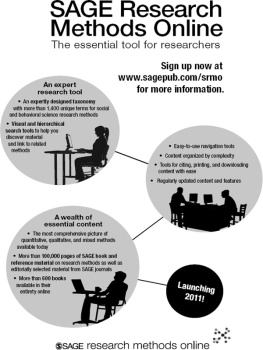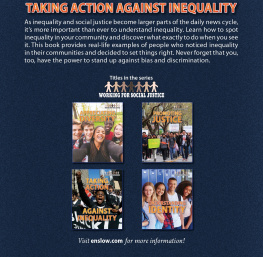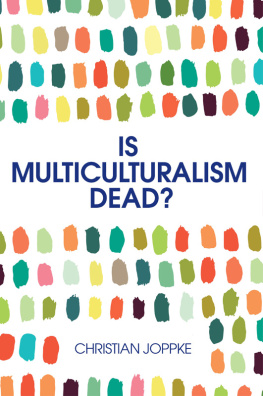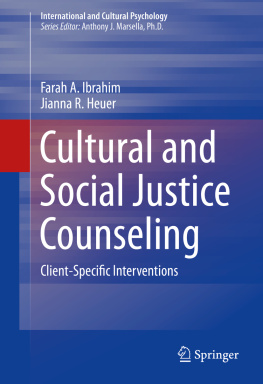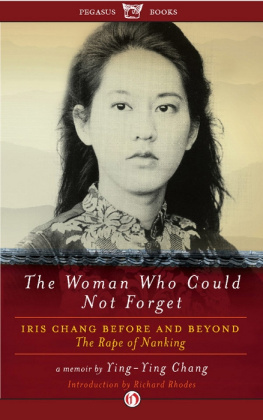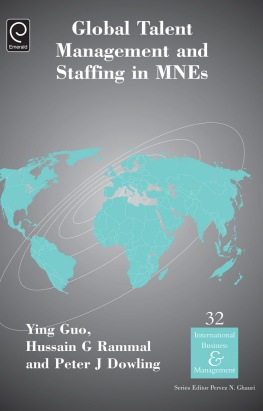Social Justice Counseling
I (Rita Chi-Ying Chung) dedicate this book to my parents: Jack Tai Hing Chung and Daphne Chung (Young Lai Yung), who taught me everything I know about social justice and instilled in me the passion, the strength, the courage, and the fearlessness to speak up and speak out against social injustices and human rights violations.
I (Fred Bemak) dedicate this book to my parents, Walter and Ruth Bemak, who have, in the most profound and deepest way, shown the path for the next generation to somehow help this world be a better place, and to my incredible daughters, Amber and Lani, for carrying social justice into the next generation and helping me know that it was and is all worth it.
Social Justice Counseling
THE NEXT STEPS BEYOND MLUTICULTUTALISM
Rita Chi-Ying Chung
Frederic P. Bemak
George Mason University


FOR INFORMATION:
SAGE Publications, Inc.
2455 Teller Road
Thousand Oaks, California 91320
E-mail:
SAGE Publications Ltd.
1 Olivers Yard
55 City Road
London EC1Y 1SP
United Kingdom
SAGE Publications India Pvt. Ltd.
B 1/I 1 Mohan Cooperative Industrial Area
Mathura Road, New Delhi 110 044
India
SAGE Publications Asia-Pacific Pte. Ltd.
33 Pekin Street #02-01
Far East Square
Singapore 048763
Acquisitions Editor: Kassie Graves Editorial Assistant: Courtney Munz Production Editor: Eric Garner Copy Editor: Cate Huisman Typesetter: C&M Digitals (P) Ltd. Proofreader: Sally Jaskold Indexer: Maria Sosnowski Cover Designer: Bryan Fishman Marketing Manager: Katharine Winter Permissions Editor: Adele Hutchinson
Copyright 2012 by SAGE Publications, Inc.
All rights reserved. No part of this book may be reproduced or utilized in any form or by any means, electronic or mechanical, including photocopying, recording, or by any information storage and retrieval system, without permission in writing from the publisher.
Printed in the United States of America
Library of Congress Cataloging-in-Publication Data
Chung, Rita Chi-Ying.
Social justice counseling: the next steps beyond multiculturalism/Rita Chi-Ying Chung, Frederic P. Bemak
p. cm.
Includes bibliographical references and index.
ISBN 978-1-4129-9952-6 (pbk.)
1. Cross-cultural counseling. 2. Psychiatry, Transcultural.
3. Social justice. I. Bemak, Fred. II. Title.
BF636.7.C76C48 2012
616.8914dc23 2011031258
This book is printed on acid-free paper.
11 12 13 14 15 10 9 8 7 6 5 4 3 2 1
CONTENTS
ACKNOWLEDGMENTS
T his book would not have come about without the support and dedication of many people. We would like to thank Diana Ortiz and Mandi Gordon, who have been invaluable in assisting us with the preparation of this book. We would also like to thank Reston Bell, Liz Davis, Jan Weng, Kate Golkow, Rodolfo Marenco, Candace Fleming, Brad Pabian, Hollie Jones, and Diana Ortiz for their powerful narratives, which help the book come alive with true life stories about social justice. We would also like to thank our colleagues at SAGEKassie Graves, who through her constant support and encouragement helped to bring this book to completion; and Cate Huisman, who one can only dream about having as a copy editor.
In addition we would both like to deeply thank all of the many students who have taken up our challenge and dared to take the risk and find the courage to confront themselves and others regarding multicultural social justice issues. You are the pathway for the next generation of multicultural social justice counselors, and we write this book in your honor.
I (Rita Chi-Ying Chung) would like to thank my coauthor, colleague, and partner Fred Bemak for his continuous support and dedication to social justice work, who has led by example in walking his talk. And in turn, I (Fred Bemak), would extend my deepest appreciation and gratitude to my coauthor, colleague, and partner, Rita Chi-Ying Chung, for being the absolute embodiment of living a life filled with social justice values and being an incredible model for multicultural social justice work.
PART I
INTRODUCTION TO COUNSELING AND SOCIAL JUSTICE
INTRODUCTION
We must become the change we want to see in the world.
(Mahatma Gandhi)
T he writing of Social Justice Counseling: The Next Steps Beyond Multiculturalism in Application, Theory, and Practice has taken place during the last ten years. It has been a journey that parallels the multicultural social justice movement within the mental health field, fraught with strong reactions to the content of the book. These have been both highly laudatory andin the earlier years of writingstrongly critical about the place of social justice within the context of counseling, psychology, and social work. Over the ten years since this book became an idea, the mental health field has broadened to more easily include issues of social justice as integral to the work of psychologists, counselors, and social workers, and the criticism about social justice as a fundamental aspect of counseling has diminished, albeit not disappeared. Based on our work, our experiences, and our commitment to justice, equality, and equity for all people, and the critical issue of redistributing power and privilege as a means toward social justice, we have stayed the course with this book and are delighted to share with you our thoughts and experiences related to multicultural social justice counseling.
This book has a foundation in the amazing work of many colleagues who have paved the way in the field for multicultural counseling and psychology (e.g., Joseph Aponte, Patricia Arredondo, Manuel Casas, William Cross, Michael DAndrea, Judy Daniels, Juris Draguns, Janet Helms, Farah Ibrahim, Allen Ivey, Teresa LaFromboise, Anthony Marsella, Thomas Parham, Paul Pedersen, Joseph Ponterotto, Don Pope-Davis, Issac Prilleltensky, Maria Root, Derald Wing Sue, Stanley Sue, Joseph Trimble, Clemont Vontress, and many others). The chapters in this book build on the incredible work and efforts of the pioneers in the multicultural field and present ways to embed social justice as the next step in the counseling, psychology, and social work fields. This book is a first step in systematically looking at how to integrate social justice into the mental health field without it being absorbed and diluted in the multicultural work that has taken root and now constitutes a cornerstone of contemporary counseling with an emphasis on cultural diversity and plurality.
Social inequities that are rooted in oppression, intolerance, privilege, power, and inequities are not new. For a long time, discrimination, oppression, and intolerance have methodically excluded people based on race, ethnicity, culture, sexual orientation, socioeconomic status, gender, age, religion, physical disability, mental disability, and so forth, and this has created obstacles to access, opportunity, and participation. Counselors, psychologists, and social workers are constantly working with clients, families, communities, and schools that experience profound issues of oppression, discrimination, social inequities, unfair treatment, and disproportionate privilege, as well as unequal social, political, and economic access. Yet, consistent with the origins of Western psychology, we frequently focus on the individual and her or his pathology or strengths, rather than the broader social, economic, political, and ecological context.

